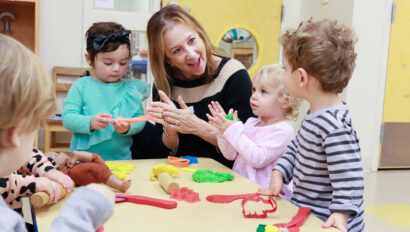The Value of Saying “No”
Picture this: a mom is in a medical office waiting room with both of her children, ages two and four. While she is waiting for her appointment, her children are running amok. They are kicking the doors, throwing the magazines to the floor, tearing them apart, climbing on the furniture and jumping from chair to chair. The older child is pushing and acting aggressively with the younger child, who is howling as a result. Embarrassed, mom is chasing after her kids, picking up the magazines, asking for scotch tape to repair what has been torn, and wiping at the scuff marks on the doors and walls. She lamely tells the kids to stop, but they ignore her. These behaviors continue until they are all called into the inner office, where mom apologizes for her kids’ behaviors, saying, “Kids will be kids.” An opportunity for learning has been missed.
Now picture these same kids at the local drugstore. There are toys, candy, and all manner of attractive items placed at the child’s eye level, near the cashier. We’ve all been witness to the outcome- screaming kids insisting on getting yet another yellow school bus, or a pack of Skittles, and embarrassed moms and dads who are unable to say, “No,” and stick to it, ultimately giving in and purchasing these unnecessary items. Another opportunity for learning has been missed.
Picture these same kids on a playdate, at the home of a friend. They engage in similar destructive behaviors, tearing apart the home and screaming at the unfairness of not getting what they want, until the playdate is over and they go home, never to be asked over again.
Finally, picture these same kids at school. They have difficulty learning how to accept rules of game play and have problems during recess, becoming upset when they don’t get to go first, don’t get the position they would like to play, or the color token they want. They don’t ever seem to be happy with what they have.
Parents are very much invested in keeping their children happy all the time. While I agree that all children need to be happy and safe, I understand that in order to achieve this goal, a child must be taught that there are certain things that he/she cannot do, and that there are things that he/she does not need.
Teaching a child to accept “No,” is extremely important for psychosocial and emotional development, as well as for their personal safety. It helps the child to gain control of their innate impulsivity, to learn how to behave appropriately, and to tolerate disappointment. When a child is told that they cannot touch the hot stove, they are learning that certain items in their environments are not safe and that that they are being told, “No,” for their own protection. When they are told that they cannot hit their siblings or jump on the furniture, they are learning to inhibit inappropriate physical behaviors. In the same way, when they are told that they cannot do, or have, something that they want, they are learning to experience the emotions associated with disappointment- such as sadness and anger. They get an opportunity to learn how to accept disappointment, and to learn how to express the resulting emotions in acceptable ways. They learn to use the language of emotions to express their feelings to those around them. At first they may tantrum; but as they develop, they learn that they can be angry and sad, in reasonable ways. They also learn that they can become upset and then recover and move on. This is a critical skill, as we all experience disappointments in life, and need to develop the ability to get over them and to be able to move on. It is important for a child to learn that he/she cannot have everything they see or want, and that this is okay. It helps them to develop flexibility and adaptability, which enables them to engage with their peers and the adults in their environment successfully. In addition, when they do get what they’ve been wanting, they are able to be grateful and enjoy the experience more fully. It allows them to be satisfied and happy for what they have, and to strive for what they want. These are extremely important skills to learn in order to be able to function as a part of their family, classroom, group of friends and ultimately, in their jobs and community. Saying “No” should not be verboten, but should be looked at as an opportunity for learning.

Written by Lisa H. Bernholz-Balsam MS, CCC-SLP/A
Speech and Language Therapist, Therapeutic Nursery
Kaplen JCC on the Palisades


